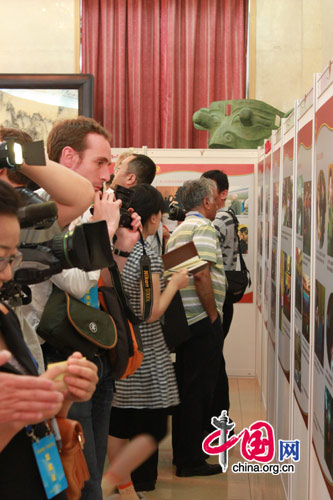CPC Int'l Dep. hosts foreign reporters
As the Communist Party of China (CPC) celebrates the 90th anniversary of its founding, a key goal has been to increase transparency. With this goal in mind, last Friday the CPC Central Committee hosted over 50 foreign reporters at an "open-door" event at its International Department headquarter office in Beijing.
Journalists from international and domestic media got a rare internal perspective of the functions of the department via a press briefing on the department's functions, a photo exhibition, and an unscripted question-and-answer session with Vice Minister Ai Ping.
The delegation also witnessed part of a live discussion between Vice Minister Ai and his counterparts from Mozambique's FRELIMO Party.
At the press briefing, department spokesman Huang Huaguang acknowledged the department's historical lack of communication with the press and attempted to shed light on its many roles, including facilitating "party-to-party" diplomatic exchanges with foreign political leaders.
"In external relations, [The CPC] does not draw ideological lines. We also engage in contact with parties who have ideologies different from ours," Huang said.
Made up of eight bureaus for each of the world's geographic regions, the department maintains ties with more than 600 political parties in 160 countries and regions in the world. Each bureau holds direct party-to-party exchanges with foreign political leaders as well as and research and information gathering missions. The purpose of these activities is to build mutual trust and discuss solutions to pressing global issues, Huang said.
"Against the background of accelerated globalization there are more global problems," Huang said. "For instance, the international financial crisis has posed serious challenges to our economy, our politics, our society as well as the development of our culture. We hold seminars to discuss our views on these challenges as well as ways to cope with these challenges."
At the ensuing Q-and-A session with Vice Minister Ai Ping, questions posed by the journalists ranged from the status of relations with the Democratic People's Republic of Korea, to changes in the Party line, as well as the future of Communist and Socialist ideals. Ai was candid and conservative in his responses, conceding that over the past few decades the party has changed in response to internal and international pressures.
A question from an Indian reporter about Chinese support for revolutionary and extremist parties garnered what may have been one of the more surprising and frank responses of the event.
Ai began by strongly denying any exchanges between the CPC and illegal or extremist parties in any country, but followed that by acknowledging a shift from a historical support of revolution to a policy of non-intervention.
"Historically, indeed, the CPC supported world revolution, however at that time, we believed and we still believe that revolution can not be exported, but rather must be chosen by the people of a certain country," Ai said.
As for the future of the communist party, Ai referenced a 1992 book by American scholar Francis Fukuyama titled "The End of History and the Last Man" in which Fukuyama argued that the world had seen the last form of government in Western-style liberal democracy. Ai argued that Fukuyama's point has been misunderstood and that world history has not come to a halt, but rather will continue to transform.
"What we are doing now is [continuing] the modernization of the socialist society and also the improvement of the socialist system, through the implementation of reform," Ai said. "We have confidence in the future of socialism and communism."
Journalists attending the event had mixed expectations coming in, but some said they were pleased by the exchanges.
Johnny Erling of the German publication Der Standard said he enjoyed Ai's comments on China's historical change in policy regarding "exporting revolution" as well as the country's high concern for DPRK relations, among other issues.
"[Ai] didn't shy away from questions about what [the CPC] stands for," Erling said.
Corey Cooper of China.org.cn contributed to reporting for this story.
 0
0 







